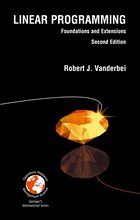Linear Programming: Foundations and Extensions is an introduction to the field of optimization. The book emphasizes constrained optimization, beginning with a substantial treatment of linear programming, and proceeding to convex analysis, network flows, integer programming, quadratic programming, and convex optimization.
The book is carefully written. Specific examples and concrete algorithms precede more abstract topics. Topics are clearly developed with a large number of numerical examples worked out in detail.
Moreover, Linear Programming: Foundations and Extensions underscores the purpose of optimization: to solve practical problems on a computer. Accordingly, the book is coordinated with free efficient C programs that implement the major algorithms studied:
-The two-phase simplex method; -The primal-dual simplex method; -The path-following interior-point method; -The homogeneous self-dual methods.
In addition, there are online JAVA applets that illustrate various pivot rules and variants of the simplex method, both for linear programming and for network flows. These C programs and JAVA tools can be found on the book's webpage: http://www.princeton.edu/-rvdb/LPbook/. Also, check the book's webpage for new online instructional tools and exercises that have been added in the new edition.
The book is carefully written. Specific examples and concrete algorithms precede more abstract topics. Topics are clearly developed with a large number of numerical examples worked out in detail.
Moreover, Linear Programming: Foundations and Extensions underscores the purpose of optimization: to solve practical problems on a computer. Accordingly, the book is coordinated with free efficient C programs that implement the major algorithms studied:
-The two-phase simplex method; -The primal-dual simplex method; -The path-following interior-point method; -The homogeneous self-dual methods.
In addition, there are online JAVA applets that illustrate various pivot rules and variants of the simplex method, both for linear programming and for network flows. These C programs and JAVA tools can be found on the book's webpage: http://www.princeton.edu/-rvdb/LPbook/. Also, check the book's webpage for new online instructional tools and exercises that have been added in the new edition.

